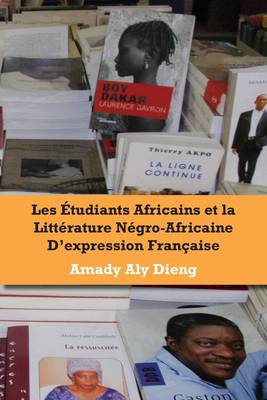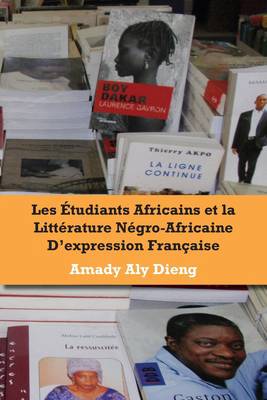
Door een staking bij bpost kan je online bestelling op dit moment iets langer onderweg zijn dan voorzien. Dringend iets nodig? Onze winkels ontvangen jou met open armen!
- Afhalen na 1 uur in een winkel met voorraad
- Gratis thuislevering in België vanaf € 30
- Ruim aanbod met 7 miljoen producten
Door een staking bij bpost kan je online bestelling op dit moment iets langer onderweg zijn dan voorzien. Dringend iets nodig? Onze winkels ontvangen jou met open armen!
- Afhalen na 1 uur in een winkel met voorraad
- Gratis thuislevering in België vanaf € 30
- Ruim aanbod met 7 miljoen producten
Zoeken
Les etudiants africains et la litterature negro-africaine d'expression francaise
Amady Aly Dieng
Paperback | Frans
€ 39,45
+ 78 punten
Omschrijving
It is more than forty seven years ago that the Federation of black African students in France (FEANF) organised its first seminar in Paris on the relationship between black African literature and politics. The significance of the event came from the fact that literature served as a vehicle for unmasking traitors in Africa. This was also an opportunity for African students to define the role of literature in political struggles and to appreciate correctly and objectively the commitments of African writers in French. At no time was it a question of over emphasising the importance of this type of work in relation to the immense political challenges in the liberation struggle of African countries. Despite their ideological, religious and philosophical differences, African intellectuals were all committed to African independence and unity, and the need for a critical appraisal of the contribution of African literature in this regard. Participants at this seminar accomplished this task in serenity and with much lucidity. The young generation of pupils and students have the right to know the opinions of their elders who took part, in various degrees and for various reasons, in the struggles for independence on the African continent.
Specificaties
Betrokkenen
- Auteur(s):
- Uitgeverij:
Inhoud
- Aantal bladzijden:
- 180
- Taal:
- Frans
Eigenschappen
- Productcode (EAN):
- 9789956558308
- Verschijningsdatum:
- 29/04/2009
- Uitvoering:
- Paperback
- Formaat:
- Trade paperback (VS)
- Afmetingen:
- 152 mm x 229 mm
- Gewicht:
- 226 g

Alleen bij Standaard Boekhandel
+ 78 punten op je klantenkaart van Standaard Boekhandel
Beoordelingen
We publiceren alleen reviews die voldoen aan de voorwaarden voor reviews. Bekijk onze voorwaarden voor reviews.











